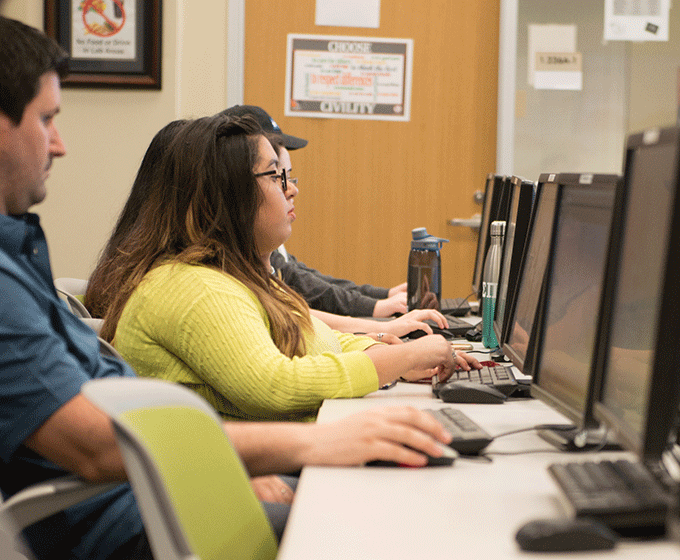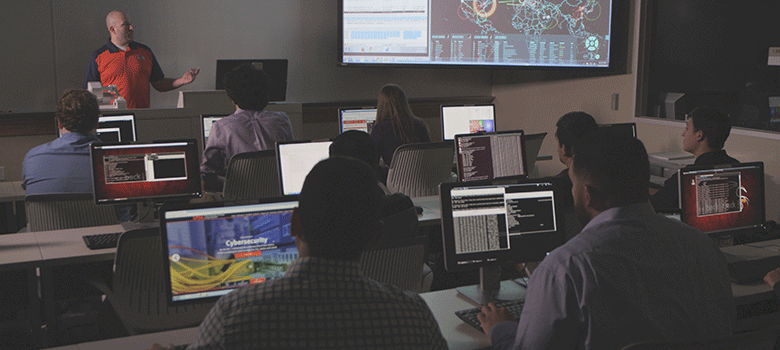
OCTOBER 12, 2023 — With a cybersecurity threat occurring every 39 seconds and costing more than $6.9 million in fraud annually according to the FBI, the need for professionals trained to thwart these attacks is critical. UTSA is helping fight this danger through its nationally recognized cybersecurity programs.
The undergraduate and graduate cybersecurity degree programs in the Carlos Alvarez College of Business (ACOB) at UTSA has grown over 70% over the past five years — going from housing 1,238 students to 2,210 today. The students are enrolling in programs that include the bachelor’s degree in cybersecurity, the online bachelor’s degree in cybersecurity, the master’s degree in information technology with a cybersecurity concentration and the doctoral degree with a concentration in information technology.
“What surprises most people is that our programs are located in a business school, but this is intentional,” said Nicole Beebe, UTSA professor of information systems and cyber security. “UTSA students receive fundamental business training in addition to highly technical training in cybersecurity. More importantly, the variety of course work that we offer allows our students to be well-rounded but also to focus in unique specialty areas.”

Cybersecurity is an extremely diverse field with highly technical specialties such as cryptography and digital forensics as well as disciplines in cyber behavior and policy. The college’s cybersecurity majors take 36 hours of coursework in cybersecurity, and they can choose from courses in a wide variety of areas such as secure mobile app development, digital forensics, network security, cybercrime investigations, intrusion detection, cyber law, cyber analytics and malware analysis.
A huge selling point of the program was “the prestige and excellent reputation of UTSA’s cybersecurity program,” said Jeff Miller, an undergraduate cybersecurity student from Katy, Texas. “As I began to look into the classes I would be taking, I concluded that the business-focused curriculum would be substantial in preparing me for my future career.”
In an effort to reach even more students, UTSA launched a fully online B.B.A. in Cyber Security in 2017. The program, which offers identical content to the residential program, has grown over 410% to almost 500 students since its founding.
“Students are learning cutting-edge material in a hands-on environment but have greater flexibility as part of our online program,” said Rita Mitra, a cybersecurity professor who has taught in the online program since its inception. “Cyber classes by nature use virtual machines to simulate various scenarios and computing environments, so online students have the ability to complete the same assignments as students on campus.”
Beebe, who also serves as UTSA’s associate vice president for research and development, added that “our faculty don’t just teach from textbooks. They create custom content that students can’t get anywhere else. Our national No. 1 ranking by Ponemon in 2014 was a pivotal point for us. The timing of the ranking along with the increase in cyber-attacks put our program on the map.”
UTSA is one of the few universities nationally — and only Hispanic Serving Institution — to hold all three National Center of Academic Excellence designations from the National Security Agency and the U.S. Department of Homeland Security.
UTSA’s commitment to innovate as the industry evolves is another way its cybersecurity program has maintained its dominance in higher education. The newest program offered ACOB is a B.S. in Applied Cyber Analytics. Combining analytics and cyber security training, students utilize machine learning and artificial intelligence tools to address cyber threats.
“In 20 years, society will look back at the launch of this degree program and realize how innovative the Alvarez College was in establishing it,” Beebe said. “Cyberattacks are coming so quickly that it is a losing battle for a person to parse through all of that data. But if our students are trained to use analytical tools well, they can recognize attacks much sooner.”
Elizabeth Reyes, a graduate cybersecurity student was drawn to the program’s emphasis on hands-on experience and real-world applications, which she believes are crucial in the field.
“In my Security Risk Analysis class, we have the freedom to explore all the different tools in SimSpace and implement what we learned in the college’s Cybersecurity Lab,” Reyes said.
SimSpace provides a training ground for cybersecurity students to learn about cyberattacks and practice their skills in a realistic environment. This virtual environment enables them to test their cyber defenses and to prove their processes against the intensity and uncertainty of aggressive cyber adversaries.
As one of the largest cyber and information security cities outside of Washington, D.C., San Antonio ranks second in federal and defense contracting opportunities and its concentration of cybersecurity professionals.
“As a hub for cybersecurity and technology, UTSA and San Antonio provide numerous opportunities for networking and internships, which was an important factor in my decision to attend here,” Reyes said.
According to the U.S. Bureau of Labor Statistics, the cybersecurity sector is expected to grow 32% over the next 10 years with the need for over 700,000 cybersecurity professionals in the United States alone.
“Over the years, the sheer number and the nature of the companies recruiting at UTSA has vastly improved,” Beebe said. “UTSA students are valued in the marketplace for their knowledge, their skills and their determination to make a difference in this industry.”
UTSA Today is produced by University Communications and Marketing, the official news source of The University of Texas at San Antonio. Send your feedback to news@utsa.edu. Keep up-to-date on UTSA news by visiting UTSA Today. Connect with UTSA online at Facebook, Twitter, Youtube and Instagram.
This event will acknowledge graduating seniors from the McNair Scholars program at UTSA before inducting the new cohort of scholars into the program.
North Paseo Building (NPB 5.140), Main CampusAt this memorable celebration, UTSA graduates will be introduced one-by-one to cross the stage and accept their doctoral degrees.
Arts Building Recital Hall, Main CampusRoadrunner Walk is an event for graduating students to have a memorable walk on campus to celebrate an important milestone and their achievements. Graduates will walk along the Paseo while being celebrated by the UTSA community, friends, and family members.
Student Union Paseo, Main CampusCelebrate the accomplishments of College of Education and Human Development, College for Health, Community and Policy, College of Sciences and University College.
Alamodome, 100 Montana St.Celebrate the accomplishments of Alvarez College of Business, College of Liberal and Fine Arts and Klesse College of Engineering and Integrated Design.
Alamodome, 100 Montana St.The University of Texas at San Antonio is dedicated to the advancement of knowledge through research and discovery, teaching and learning, community engagement and public service. As an institution of access and excellence, UTSA embraces multicultural traditions and serves as a center for intellectual and creative resources as well as a catalyst for socioeconomic development and the commercialization of intellectual property - for Texas, the nation and the world.
To be a premier public research university, providing access to educational excellence and preparing citizen leaders for the global environment.
We encourage an environment of dialogue and discovery, where integrity, excellence, inclusiveness, respect, collaboration and innovation are fostered.
UTSA is a proud Hispanic Serving Institution (HSI) as designated by the U.S. Department of Education .
The University of Texas at San Antonio, a Hispanic Serving Institution situated in a global city that has been a crossroads of peoples and cultures for centuries, values diversity and inclusion in all aspects of university life. As an institution expressly founded to advance the education of Mexican Americans and other underserved communities, our university is committed to promoting access for all. UTSA, a premier public research university, fosters academic excellence through a community of dialogue, discovery and innovation that embraces the uniqueness of each voice.